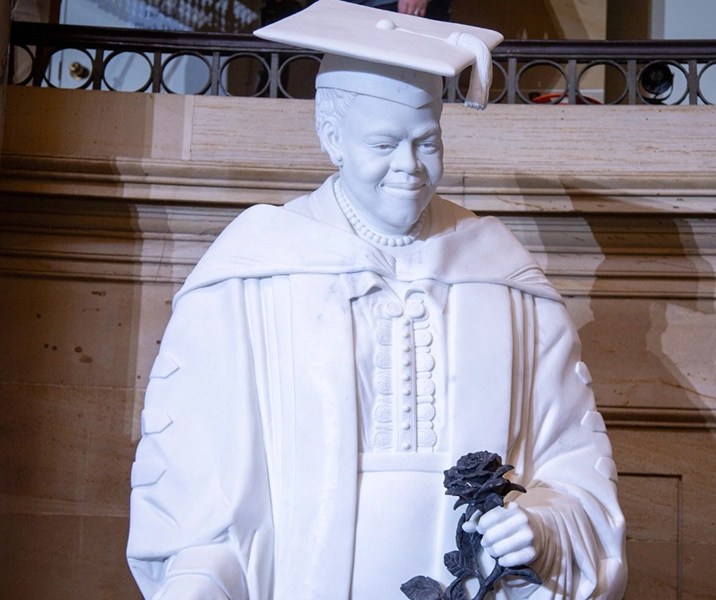National Commentary
“The Black Rose”

By New Journal and Guide Staff
Norfolk, VA
The newly installed Mary McLeod Bethune Statue in the National Statuary Hall State Collection stands 11 feet tall and depicts Dr. Bethune in cap and gown, a pearl necklace with a walking cane in one hand, a black rose in the other, and a gentle smile. She is standing in front of a stack of books atop a marble slab engraved with the state of Florida, her full name, her birth and death dates and a famous quote that exemplifies her legacy: “Invest in the human soul, who knows, it may be a diamond in the rough.”
World-renowned artist Nilda Comas created the statue out of the largest (and last) piece of statuary marble out of Michaelangelo’s cave in the Alps, weighing 11,500 tons.
Comas was chosen from among 1,600 applicants and is the first Hispanic sculptor to create a statue for Statuary Hall.
All of the symbols selected by Comas speak clearly to the long and productive life led by the famous educator, historian, diplomat, and civil and human rights activist whose name graces the college she started as a training school for Black girls in Florida.
Or do they?
What abut the “black rose”?
According to Nancy Rae Lohman of the Dr. Mary McLeod Bethune Statutary Fund, Inc. the “black rose” Bethune is holding was inspired by a poem she wrote “A Rose by Any Other Name.”
In the first stanza, Bethune wrote:
“I never saw a garden so beautiful, roses of all colors. And in the mindset of the garden I saw a great Black Velvet Rose.
“I never saw a Black Velvet Rose before and I said to myself; ‘Oh! This is the great interracial garden; this is the garden where we have people of all colors, all classes and creeds.”
Lohman is trying to find the date of the poem and perhaps to determine if Dr. Bethune was a serious poet in addition to her other known accolades.
In any event, Lohman’s Dr. Mary McLeod Bethune Statutary Fund has explained that Dr. Bethune’s love for dark roses led to her referring to her students as her “black roses”.
Thusly, the black rose is yet another symbol of Bethune’s profound work in education, as well as her Christian belief in the love commandment to “love others” as basic for the interracial, inter-religious and international brotherhood she espoused.